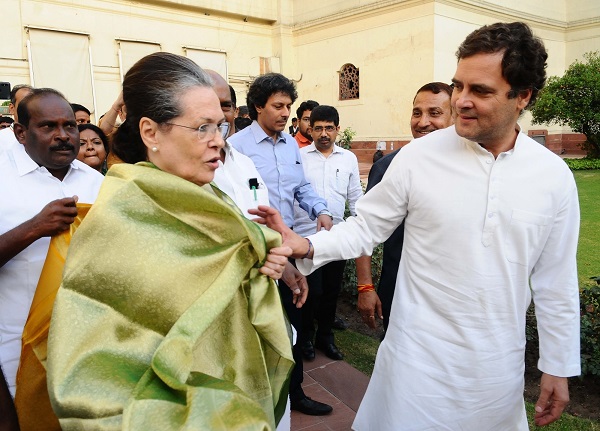
New Delhi, Reeling under the impact of disastrous result in the Lok Sabha elections, the Congress is going through a deep crisis, with uncertainty over the leadership at the top and exodus of legislators and senior leaders in some states.
The 134-year-old Congress, which ruled the country for nearly 60 years after Independence, has been witnessing serial setbacks and has been worst hit in Karnataka, Telangana and Goa.
The unrest in the Congress was fuelled by the debacle in the Lok Sabha elections, whose results came on May 23 and gave the party only 52 seats in the 545-member House.
The stunned party’s woes increased with Rahul Gandhi tendering his resignation as Congress President immediately after the poll results came, creating a sort of vacuum in the leadership and uncertainty among the cadres, which persists even though months on.
Some Congress leaders in private say that they are not aware who is running the show in the party now since Rahul Gandhi has refused to reconsider his resignation and recently made public that he was no more the President.
Veteran party leader Karan Singh, however, was an exception in making his views public, saying he was “aghast to see the confusion and disorientation” in which the Congress has fallen since Rahul Gandhi resigned on May 25.
In a statement, he said instead of putting an alternate structure in place after Rahul quit, “a month was wasted pleading” before him to take back his resignation, which “as a man of honour and integrity, he should not have been pressured to do.”
The biggest hit to the Congress came in Karnataka where the party is on the verge of losing its government, which it had managed to form in May last year in alliance with JD(S) after the Assembly polls threw up a fractured verdict.
With 13 of its 79 MLAs, along with three of the ally JD(S), tendering their resignations in the state since July 6, the Congress is struggling against all odds to save the government it is running with the 37-member JD(S).
Prior to the spree of resignations, the Congress and JD(S), along with the support of lone members of BSP and regional party KPJP and an Independent, had 118 MLAs, five more than the required simple majority in the 225-member Assembly, which includes a nominated member.
The MLA of KPJP and the Independent have also withdrawn their support.
The BJP has 105 MLAs.
After the poll debacle, Roshan Baig, a former Karnataka minister who was one of the senior Congress leaders to resign recently, had attacked some senior party leaders like K.C. Venugopal and Siddaramaiah for the poor performance.
Baig, who is among the legislators who have tendered their resignations, had said that it was because of leaders like Venugopal and Siddaramaiah that the Congress won only one seat in the recent Lok Sabha elections out of 28 seats in Karnataka, despite bagging 79 out of 225 seats in the Assembly elections held last year.
The BJP swept the Lok Sabha polls, bagging 25 seats.
Even as the Congress was grappling with the Karnataka crisis, it faced a mass exodus in Goa where 10 of its 15 MLAs, led by Leader of Opposition in the Assembly Chandrakant Kavlekar, quit the party and joined the ruling BJP.
With this, the ruling party’s tally rose to 27 in the 40-member Assembly.
Commenting on the exodus in the Congress, its MLA and former Chief Minister Digambar Kamat told IANS recently, “If the Opposition leader himself quits the party and joins the BJP, what can I say?”
The shockers for the Congress in Karnataka and Goa came just about a month after 12 out of its 18 MLAs dumped the party in Telangana to join the ruling Telangana Rashtra Samiti (TRS).
The party also faced embarrassment in Maharashtra, where its Leader of Opposition in the Assembly Radhakrishna Vikhe Patil quit in June.
There are suggestions that the Congress could face a similar situation in Madhya Pradesh too, because of simmering infighting among various camps, which got aggravated after the Lok Sabha polls.
Infighting is said to be strong in the party even in Rajasthan, where it is in power.









